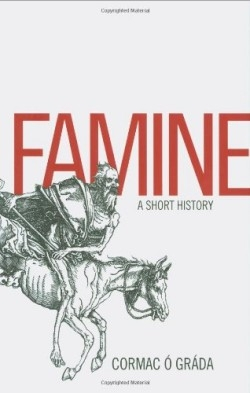Famine
A Short History
Regarded as Ireland’s premier economic historian even before the publication in 1999 of his widely praised Black 47 and Beyond: The Great Irish Famine in History, Economy, and Memory, Cormac O Grada of the University of Dublin created tremors of anticipation with the highly publicized Famine: A Short History, which establishes him more securely as a scholar in command of the field as a whole.
Its worth reiterating for the benefit of prospective readers that Grda “doesnt write like an economist,” nor does he presume that his readers bring to the book anything more than a general interest in his subject. Rather, he presents as a scholar, as a historian who is deeply fascinated by his subject and one who can make it interesting. He writes about the widespread contemporary view that famine is an easily preventable anachronism and about the intellectualized debate regarding what, precisely, constitutes famine, and how its effects ought to be assessed. The accepted standard of measurement is “excess mortality”; i.e., the number of deaths from starvation exceeding the number from all causes that would ordinarily occur in a given period. Grda points out that famine is as much a function of the policy response to hunger as it is of the physical conditions that caused the crisis.
He observes, too, that the term famine itself represents the upper end of the continuum whose average is “hunger,” and that “malnutrition, which upwards of 800 million people endure every day, might be seen as slow-burning famine.”
So, O Grada asks, are we approaching a point at which we might be able to regard famine exclusively as an event in our history and not as something that must be confronted in our future?
Probably not. In the twentieth century, famines and famine mortality were linked more often to wars and ideology than to poor harvests. The centurys major famines, O Grada says, would have been less deadly, and might not have occurred at all, had political conditions been more favorable. In fact, as he points out, “todays developed world has been spared major famine during peacetime since the mid-nineteenth century at the latest.” At the other extreme, he writes, is Niger, one of the poorest economies in the world, followed by Ethiopia and Malawi, which also remain vulnerable to famine. Given good will on all sides, he says, famine should be preventable, even in the poorest parts of the world. But this given may not yet be attainable.
Disclosure: This article is not an endorsement, but a review. The publisher of this book provided free copies of the book to have their book reviewed by a professional reviewer. No fee was paid by the publisher for this review. Foreword Reviews only recommends books that we love. Foreword Magazine, Inc. is disclosing this in accordance with the Federal Trade Commission’s 16 CFR, Part 255.

